
Farmers who are starting their own nontraditional agriculture enterprises may face a few skeptics in their pursuits. That shouldn’t deter them from trying.
Sye Tecker, a Dundy County Farm Bureau member and operator of Tecker Ranch near Parks, Neb., knows all about skeptics.
“Open a bar in a pasture 15 miles from the nearest town, and people will say that you are completely insane,” said the fifth-generation rancher who recently opened Uppa Crik Tap Room and Hop Yard in his pasture, where he serves Nebraska-made spirits. “I learned pretty quickly to check my pride at the door and not to be afraid to ask stupid questions.”
Make connections
During a young producer panel discussion at the Beginning, Young and Small Farmer Symposium held in Lincoln this past fall, Tecker told the audience that they needed to seek out people who could teach them about their new enterprise.
“I’ve run into some incredible people and made awesome connections with people who are supportive of what I’m doing,” he said. “They didn’t think I was completely insane, and so far, things have come together nicely.”
Becky Schwarz, who operates Schwarz Family Farm, an organic operation near Bertrand, Neb., said that she was lucky to have grown up in a farming operation that has been certified organic since 1998. She knew there would be detractors from their way of doing things, but that didn’t deter her from moving forward.
While their family operation focuses primarily on traditional organic row crops, such as corn and soybeans, they have also planted alfalfa, wheat and field peas. They have dabbled in high-tunnel vegetables and herbs, industrial hemp and honey, as well as blue corn, white corn and popcorn. While that kind of agricultural diversity is sometimes difficult to imagine, Schwarz said it was easier because of the support system of her family that had already been involved in organic production for many years.
“You can’t care what others are thinking about you,” she said, “because they don’t see the value in what you are doing.” She has used a number of organic resources over the years to help her develop her business, and she has nurtured a relationship with their organic certifier, because she knew she could learn from people who are involved in organic production.
“There are a huge number of people who know exactly what you are facing and what issues you are having,” Schwarz said. “They’ve heard all of the dumb questions, and they have all the information to give to you.”
Find a mentor
Finding a lender willing to take a chance on new enterprises is often a long process, said Grant Jones, a sixth-generation farmer in southwest Chase County who farms and ranches with his parents — and who founded Champion Shrimp in 2020. “We raise corn, soybeans and wheat, and run cows,” he said.
Finding another shrimp operation in Indiana to answer questions and mentor his project was the key for Jones. “They answered all of my questions for the first six months of operating,” Jones said. “They helped me with setup of my whole system and with the day-to-day operations. I was in contact with them all the time. I needed that help, and it was nice to find someone who would help a young producer get started.”
A sense of daily learning is what spurred on Greg Fripp, founder and CEO of Whispering Roots Inc., an award-winning nonprofit organization dedicated to bringing science, technology, engineering and math education, healthy food, nutrition education, and economic development to underserved communities in both rural and urban areas through the practice of aquaponics.
This system is a type of fish farming that uses the waste produced by fish to supply nutrients to hydroponic vegetables and plants, without the use of soil.
“We grow. We feed. We educate,” Fripp said. “We use experiential learning on the national and international level, teaching people with no formal education how to grow tilapia.”
Glen Smith, chairman of the Farm Credit Administration, co-moderated the panel with Mike Boehm, University of Nebraska vice chancellor. “For young people to return to the family farm, they need to think outside the box and do something that others aren’t doing,” Smith told the panelists. “That seems to be the common theme among all of you. There is risk involved, but we know that agriculture is the last true bastion of entrepreneurial spirit.”
It’s OK to struggle
A U.S. Navy veteran, Fripp walked away from a successful career in the corporate world to create the Whispering Roots organization. “I started with aquaponics, and people didn’t even know what that was. They said it was never going to work,” he recalled. “But you have to have the intestinal fortitude. What worked for me was making connections, working hard and being willing to fail. Make sure you have a support system, and you have a way to make a living while you are trying to get your operation going.”
“That’s where a lot of people struggle. I struggled, but keeping it going long enough to make it is the challenge,” Fripp added. “You have to be willing to demonstrate that it can work and stick it out and expect failure. It is the wild, wild west out there right now. Lots of people are trying to get into different things.”
As far as finding lenders and investors for new enterprises, Jones said that you can’t be afraid of hearing the word “no” when approaching lenders.
“I was told ‘no’ a couple of times,” he said. “You just take a step back. Have those conversations with them about how you move forward business-wise so it works for both sides. And always have a Plan B.”
Read more about:
Next GenerationAbout the Author(s)
You May Also Like






